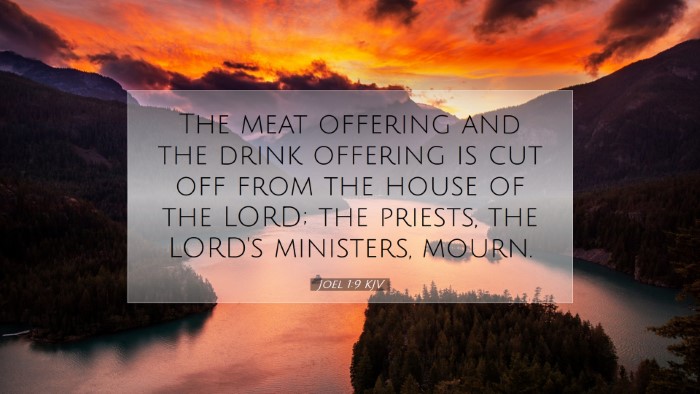Old Testament
Genesis Exodus Leviticus Numbers Deuteronomy Joshua Judges Ruth 1 Samuel 2 Samuel 1 Kings 2 Kings 1 Chronicles 2 Chronicles Ezra Nehemiah Esther Job Psalms Proverbs Ecclesiastes Song of Solomon Isaiah Jeremiah Lamentations Ezekiel Daniel Hosea Joel Amos Obadiah Jonah Micah Nahum Habakkuk Zephaniah Haggai Zechariah MalachiJoel 1:9
Joel 1:9 KJV
The meat offering and the drink offering is cut off from the house of the LORD; the priests, the LORD's ministers, mourn.
Joel 1:9 Bible Commentary
Commentary on Joel 1:9
Joel 1:9 reads: "The meat offering and the drink offering is cut off from the house of the LORD; the priests, the LORD's ministers, mourn." This verse serves as a poignant reminder of the desperate spiritual condition of Judah at this time. The following commentary draws insights from esteemed public domain sources including Matthew Henry, Albert Barnes, and Adam Clarke.
Context and Background
The Book of Joel is a unique prophetic text that addresses the consequences of sin and the need for repentance. This particular verse occurs in the context of a locust plague described throughout this chapter, representing not just a physical devastation but a profound spiritual drought.
Interpretation of the Text
- Cutting off of Offerings: The "meat offering and the drink offering" symbolize the essential elements of worship that brought communion between the people and God. The cessation of these offerings indicates a break in this vital relationship. As Matthew Henry notes, such worship was central to the life of Israel, and its absence demonstrates the depth of the national distress.
- The Role of the Priests: The mourning of the priests reflects their dual role as spiritual leaders and intermediaries between God and the people. Albert Barnes emphasizes that the priests' sorrow indicates a significant loss of reverence for worship, as they cannot perform their sacrificial duties. This mournfulness also illustrates the gravity of sin and implies that the community's relationship with God is severely impacted.
- Divine Judgment: Adam Clarke discusses this commentary as indicative of divine judgment. The withholding of offerings and the lamentation of the priests signify God's displeasure due to the unfaithfulness and idolatry of the people. The economic and agricultural impacts of the locusts serve as a divine corrective to bring Israel back to genuine worship.
Theological Implications
Joel 1:9 encapsulates several theological implications that are critical for understanding the nature of God’s relationship with His people.
- The Importance of Worship: Worship is not merely a ritual; it embodies the essence of covenant relationship. The cessation of the offerings serves as a stark reminder that when our relationship with God falters, our capacity to worship suffers greatly.
- Intercessory Role of Spiritual Leaders: The priests’ mourning reflects their burden for the people. This emphasizes the teaching that leaders bear a responsibility not just for their spiritual health but for the spiritual climate of their community.
- Call to Repentance: The mournfulness of the priests and the cessation of offerings serve as a call to collective repentance. The leaders of the community, represented by priests, must guide the people back to God, encouraging a return to righteous living and worship practices.
Practical Application for Pastors and Leaders
This verse should inspire pastors and church leaders to reflect on their role as stewards of worship and spiritual health within their congregations.
- Nurturing True Worship: It is essential to cultivate an environment where genuine worship can thrive. This involves teaching the congregation about the significance of their offerings, both material and immaterial, in the life of faith.
- Encouraging Spiritual Vitality: Pastors are called to foster a community that is responsive to God through prayer, worship, and collective repentance. They must not only lead by example in their personal worship but also encourage others to engage deeply with their faith.
- Being Attentive to God’s Voice: Just as the locust plague served as a warning, leaders should be attuned to the spiritual state of their congregants and be responsive to the signs of distress indicating a need for renewal and revival.
Conclusion
Joel 1:9 serves as a sobering reminder of the consequences of neglecting worship and the resultant mourning that occurs when the offerings to God cease. As we reflect on this verse, may it inspire a deeper commitment to the practice of worship, a.call for repentance, and the recognition of the heavenly calling of leadership within the body of Christ. As Henry, Barnes, and Clarke illustrate through their commentary, every moment of worship carries the weight of our covenant with God, and it is a privilege and responsibility to uphold that relationship with intentionality and reverence.


